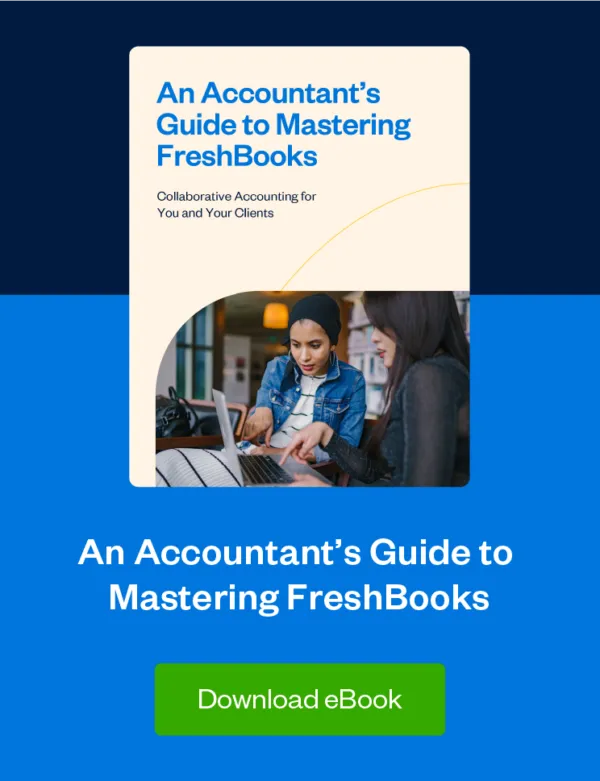The best bookkeeping, organizational, and financial tools for your small business clients’ needs and budgets.

When you introduce clients to time-saving tools and applications that make their workload more manageable, it’s a win-win. They appreciate vetted recommendations from a trusted adviser, and you strengthen your role as an essential partner for your clients by offering advisory services.
Plus, when all (or even some) of your clients use the same tools, it’s easier to streamline your own processes and scale your business.
Important Tips
Many accountants and bookkeepers try to be all things to all people, adapting to whichever tools and apps their clients use. This may be easier in the short term, but it’s inefficient for you and your clients in the long run.
There are hundreds, if not thousands, of apps in the cloud accounting/small business ecosystem, and you can’t be an expert on all of them.
Convincing your clients to switch to an all-in-one tool (like FreshBooks) may take some effort. But it will simplify your workflow and streamline your technology stack. Your clients benefit, too. They will save time and likely get better services from you, since you’ll be intimately familiar with the tools and systems they’re using.
Ensure that any solution you recommend has the following traits:
- Cloud-based. Cloud-based tools make collaboration easy and effective. You and your clients can easily share data and work effectively on projects remotely and in real-time.
- Integrates with other systems and tools you already use and like. Siloed applications waste productivity and lack real-time visibility. Before investing or recommending any tool or app, make sure it plays well with others.
As a FreshBooks partner, many of the solutions I recommend are ones that integrate best with FreshBooks. However, there are many other options out there. It’s a good idea to take advantage of free trials to see which ones work well with the tools you already use and love.
Bookkeeping Tools
Tracking revenues, expenses, assets, and liabilities is a fundamental part of running a successful business. The right tools for accounting and bookkeeping can increase efficiency, help your clients better manage cash flow, and make tax time easier. Here are a few to consider.
Time-Tracking
Time-tracking tools offer several advantages. First, if you bill by the hour, they ensure you get paid for your time and your employees’ time.
Even if you don’t bill by the hour, time tracking provides useful metrics. It allows business owners to determine the total time spent on certain clients or projects and how efficient team members are. This information helps measure capacity and profitability and see which clients or business activities are profitable and which may need realignment.
Recommendation: FreshBooks has built-in time tracking that your clients can use to track time spent on different services and ensure billable hours make it onto invoices. Some other great time-tracking options are Toggl Track and 17Hats.
Expense Tracking
Revenue is key to business growth, but a business needs to track expenses, categorize them into meaningful groups, and understand whether they provide value to get a clear picture of profitability. Businesses that don’t keep a good handle on expenses can run into several issues, including reduced revenue when billable expenses aren’t matched to projects and higher tax liabilities when they miss out on valuable tax deductions.
Yet capturing all that data can be elusive and time-consuming. That’s why your small business clients need expense tracking tools that allow them to capture bank and credit card transactions and receipts.
Recommendation: Dext allows you to easily snap a photo or upload your receipts, invoices, and bank statements. Then the software extracts the necessary info—like the date, amount, and vendor—and automatically uploads and categorizes transactions into your cloud accounting platform.
Billing and Invoicing
Every bookkeeper and accountant has worked with a client with strong revenues but poor cash flow because they’re not sending invoices promptly, tracking receivables, or following up on past-due invoices.
That’s why billing and invoicing tools are so essential. In fact, a study from PYMNTS found that companies that take advantage of receivables automation see a 23% improvement in collections over companies that use manual accounts receivable methods.
Invoicing clients is what makes a business tick. When business owners are confident in and enjoy the program they’re using, they’re more likely to stay on top of invoicing.
Recommendation: FreshBooks has a seamless interface, a short learning curve, and flexible invoicing forms that make sending invoices a joy. Other useful features include setting up recurring invoices, automated invoice reminders, and late payment fees. These features save time and improve collections.
Payment Processing
Do your clients make it easy for their customers to pay them? In today’s fast-paced world, your clients need to create a simple, one-click experience to help their customers pay them.
If their customers need to ask them how to pay or figure out the process themselves, then immediate payments simply won’t happen. They’ll get distracted, frustrated, and put it off for later.
On the other hand, offering a variety of payment options and including links to pay on digital invoices makes it easy for customers to pay. When you make it easy, it gets done.
Recommendation: With Stripe, your small business clients can accept payments via all major credit cards, wire transfers, or direct debit for subscriptions or recurring charges. FreshBooks integrates directly with Stripe, providing a seamless pay-now process.
Payroll Solutions
Payroll is fraught with potential pitfalls. Missing a payroll can be devastating to employees who are counting on their paycheck to cover their own bills and expenses. And missing federal and state payroll tax remittance, retirement plan contribution deadlines, and payroll report filing deadlines can result in hefty penalties.
Trying to manage payroll in-house is also risky for business owners because they are then responsible for employee data security. All of this is complicated and time-consuming.
Your clients need to be running their business, not their payroll. Outsourcing to a reputable payroll solution provider lets someone else deal with navigating deadlines and data security.
Recommendation: Gusto (US), PaymentEvolution (Canada), and KeyPay (UK, Australia, New Zealand, Singapore) are all payroll software options that integrate with FreshBooks. These services do the heavy lifting so your clients can focus on running their business.
Financial Tools
Financial growth is arguably the number-one goal for small business owners. Clients can always turn to you for financial advice, these tools can help both you and your clients review past performance and run financial forecasts to make better business decisions.
Accounting Reports
The insights reports provide are the key to understanding the health of any business. While your client’s accounting software may provide a dashboard snapshot, sometimes they need to dig deeper.
Some of the most useful reports for small business owners include:
- Profit and loss statement. This report tells your clients how much money the business made and how much it spent over a certain period.
- Balance sheet. This report provides a snapshot of what the small business owns and owes at a particular point in time.
- Revenue by customer. This report tells your clients how much they made from each customer during the period. It’s useful for identifying the business’s top customers.
- Accounts receivable aging. This report helps your customers spot past-due invoices, customers who are perpetually late, and growing late balances that might require extra collection efforts.
- Accounts payable aging. Keeping track of accounts payable ensures your small business customers know who they need to pay and when, which is crucial for maintaining a positive cash flow and strong vendor relationships.
- Budget vs. actual. Comparing actual spending to the budget allows small business owners to determine where they might be overspending and identify potential growth opportunities.
These reports give business owners a thorough understanding of where the business was recently, where their finances stand now, what the near future looks like, and how to improve it.
Recommendation: FreshBooks provides all of the above-mentioned reports and more. Reports are even more useful when your clients can access them quickly. FreshBooks allows users to “favorite” them in FreshBooks so they’ll appear at the top of their reports section, making access simple.
Budgeting Tool
Budgeting helps your clients restrict spending on things that don’t support business goals and ensures their team understands strategic priorities so they know how to support them best.
A simple budgeting spreadsheet works well for very small organizations, but budgeting isn’t a one-time event. It’s something your clients should continually review and tweak throughout the year.
That’s why it’s helpful to have a budgeting tool that integrates with their accounting software. That way, you and your clients can update budget-to-actual numbers and review results without a lot of manual data entry.
Recommendation: XLReporting is a budgeting tool that connects with FreshBooks to automate the budgeting process and variance reporting. The built-in spreadsheet editor is fully compatible with Excel, so you have a familiar spreadsheet environment without manual input, copying and pasting, errors in formulas, or lack of version control.
Financial Dashboard
A financial dashboard isn’t a standalone tool, but it’s worth singling out since it is an essential feature of any good bookkeeping or accounting platform.
Financial dashboards help people better understand and engage with their business finances and keep tabs on whether the business is humming (or dragging) along.
Reports are useful for taking a deep dive into the company’s finances, but a dashboard allows your clients to quickly see their bank account balance, overdue invoices, unbilled time and expenses, and upcoming bills. This ensures they always have a pretty solid idea of what they need to do to avoid a cash crunch.
Recommendation: A clear, customizable, and actionable dashboard like the one available in FreshBooks makes it simple for clients to visualize their numbers and pay attention to the metrics that really matter.
Organizational Tools
Today, certain tools have gone beyond the label of “helpful” for small businesses and have become essential to their success. These tools will help your clients save time and energy while increasing efficiency.
Online Scheduling Solution
Trying to manually schedule meetings with clients, prospective customers, vendors, and colleagues wastes an enormous amount of time. That’s why online scheduling solutions are a crucial productivity tool. They eliminate the wasted time spent emailing back and forth to find a meeting time that works for everyone and make it easier for prospects and existing clients to connect.
Online scheduling can also take care of adjusting invitations for different time zones and let users know when appointments are booked, rescheduled, or canceled.
Recommendation: Acuity allows you and your customers to easily book appointments with one click and zero frustration. And yes, it also integrates with FreshBooks!
File-Sharing Solutions
Being able to send information back and forth securely is essential for businesses. Many tax, payroll, and other financial documents contain sensitive personally identifiable information that shouldn’t be sent via email.
Plus, going paperless is better for the environment and good for your time and sanity. Printing, opening mail, and filing documents should be a thing of the past. But your clients need to have confidence in their cloud storage solution. Security, ease of access, integration with other programs, and the ability to share with others—these are all key factors when choosing your storage solution.
Recommendation: Dropbox integrates with many programs, from project management to IT security and collaboration tools, and has rigorous security protocols in place. With both a drive for your desktop and an app for on the go, it’s simple to share, store, and collaborate on documents.
Can One Financial Tool Do It All?
The short answer is no. No single application covers every feature and app your clients need, but getting all of your clients using multifunctional software like FreshBooks that covers several categories above will streamline your tech stack, reduce costs, and save time.
Then you can select other cloud-based add-ons and integrations that work together seamlessly to eliminate redundant data entry. In the end, you’ll free up your clients’ time (and yours) to focus on growth and other business opportunities.
about the author
Kellie owns Calmwaters Cloud Accounting and for more than 10 years has partnered up with businesses to make sound business decisions to help them grow and prosper in their business and their lives.
Kellie is a member of the FreshBooks Accounting Partner Council. She started using FreshBooks in 2009 when she had a branding and marketing company. She is certified, partnered, or affiliated with over a dozen cloud technology apps and constantly explores and learns about new ones. Just ask her clients; they are often the guinea pigs of “new tech Kellie just has to try out.”
She is a Certified Professional Bookkeeper with the Certified Professional Bookkeepers of Canada and currently sits on their Board of Directors. This organization is dedicated to the education and professionalism of our profession.

 How To Help Your Client Switch to New Accounting Software
How To Help Your Client Switch to New Accounting Software How to Succeed With Your Virtual Accounting or Bookkeeping Practice
How to Succeed With Your Virtual Accounting or Bookkeeping Practice 5 FreshBooks Features Accountants Love
5 FreshBooks Features Accountants Love







